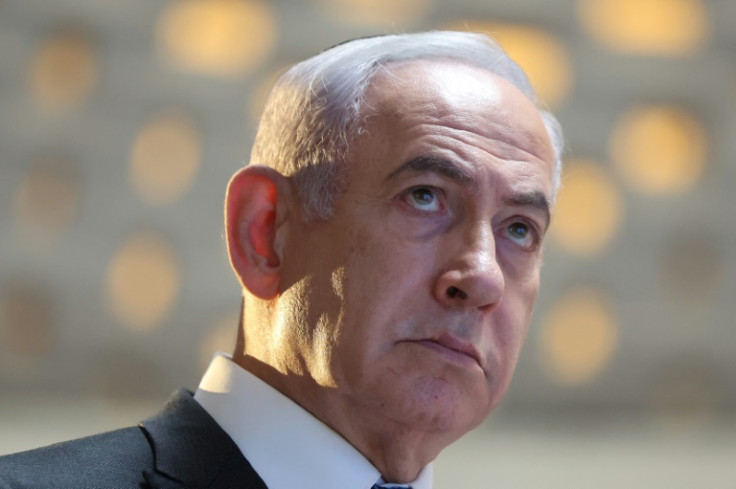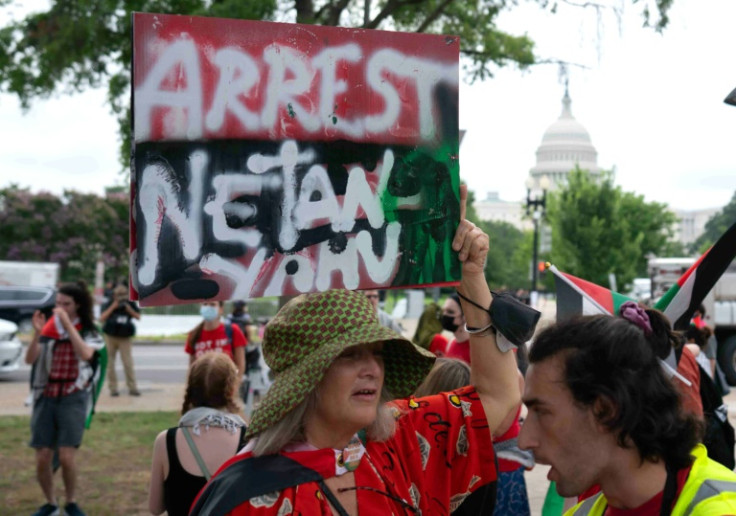Israeli PM Seeks Unity From US Congress Divided Over Gaza War

Israeli Prime Minister Benjamin Netanyahu asked for unity from lawmakers Wednesday as he addressed a US Congress divided by his military campaign in Gaza, with a rift between the nations deepening over the conflict's humanitarian toll.
Washington has become increasingly critical of Israel's nine-month war in the narrow coastal territory, while protests in Israel by families of hostages taken by Hamas are also causing headaches for Netanyahu at home.
Amid empty seats as some US lawmakers skipped the speech in protest, the Israeli leader got a rousing welcome from Republicans as he entered the historic chamber.
"For the forces of civilization to triumph, America and Israel must stand together," Netanyahu said in his address.
He also took aim at Hamas's sponsor Iran. "Our world is in upheaval. In the Middle East, Iran's axis of terror confronts America, Israel and our Arab friends," Netanyahu said.
"This is not a clash of civilizations. It's a clash between barbarism and civilization," he added.
Outside the US Capitol, thousands of protesters tried to march on the seat of US government but were kept at least a block away by police who fired pepper spray and the rally ultimately dispersed.
Netanyahu drew boos when he criticized protesters as "Iran's useful idiots."
His visit came at a time of political upheaval in the United States, with a gunman targeting Republican candidate Donald Trump, and President Joe Biden bowing out of the 2024 White House race and endorsing his deputy, Kamala Harris.
Biden will meet Netanyahu on Thursday, the White House said, to discuss progress towards a ceasefire and a hostage release deal, as well as Washington's "ironclad commitment to Israel's security."
Harris will hold separate talks with the Israeli leader Thursday but did not attend his speech due to previously scheduled travel.
Addressing the vice president's absence, an Israeli government spokesman said the speech was "bigger than any individual."
Netanyahu will also meet with Trump -- with whose administration he had a much less fraught relationship than Biden's -- in Florida on Friday.
As he spoke Wednesday, Israel's longest-serving premier became the first foreign leader to address a joint meeting of the two chambers four times -- pulling ahead of Britain's Winston Churchill.
Republican Speaker of the House Mike Johnson said Tuesday that with Israel facing attacks from various Iranian proxies, "it has never been more important than it is right now to stand with our closest ally in the Middle East."
But Netanyahu has lost backing among some liberal lawmakers, including independent Senator Bernie Sanders, who said Tuesday that "Netanyahu should not be welcomed into the US Congress."
Several other senior Democrats -- from Senate number two Dick Durbin to influential former House speaker Nancy Pelosi -- joined multiple members of the rank-and-file in announcing they would be skipping the speech.
Hours before the address, scores of protesters started gathering downtown, where Palestinian flags had been taped to street lights.
They waved banners exhorting America to "End all US aid to Israel" and assailing Netanyahu as a "war criminal" alongside a mugshot of the Israeli premier.
Israel has recently intensified its attacks on Gaza and Netanyahu has insisted that only piling on military pressure can free the hostages and defeat Hamas, which launched a shock attack on October 7 that resulted in the deaths of 1,197 people, mostly civilians, according to an AFP tally based on Israeli figures.
Hamas militants also seized 251 hostages, 116 of whom are still in Gaza, including 44 the Israeli military says are dead.
Israel's retaliatory military campaign in Gaza has killed at least 39,090 people, also mostly civilians, according to figures from the Hamas-run territory's health ministry.
Publicly, Biden has voiced strong support for Israel. But he expressed concern over an offensive on the southern Gaza city of Rafah and suspended a shipment of 2,000-pound bombs to Israel over fears that they would be used in populated areas.
Despite the tensions, the United States has defended Israeli interests while taking a key role in mediation efforts, and the countries' military relationship remains strong, officials say.
But Council on Foreign Relations Middle East specialist Steven Cook said that "never before has the atmosphere been so fraught."
"There is clearly tension in the relationship, especially between the White House and the Israeli prime minister," Cook said.


© Copyright AFP 2024. All rights reserved.






